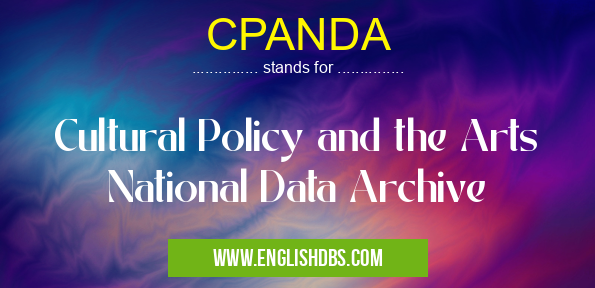What does CPANDA mean in CULTURE
CPANDA Meaning and Expansion:

CPANDA meaning in Culture in Community
CPANDA mostly used in an acronym Culture in Category Community that means Cultural Policy and the Arts National Data Archive
Shorthand: CPANDA,
Full Form: Cultural Policy and the Arts National Data Archive
For more information of "Cultural Policy and the Arts National Data Archive", see the section below.
CPANDA stands for Cultural Policy and the Arts National Data Archive. It is an extensive digital repository that houses valuable data and resources related to cultural policy, arts, and related fields in the United States.
Key Focus Areas
- Cultural Policy Research: CPANDA provides access to a comprehensive collection of research studies, reports, and data on cultural policy and its impact on the arts sector.
- Arts Statistics and Data: The archive offers a wide range of statistical data on arts participation, funding, employment, and other key performance indicators.
- Arts Policy Documents: CPANDA houses a vast collection of policy documents, including legislation, grant guidelines, and strategic plans, related to the arts and cultural sector.
- Arts Organizations Directory: The archive provides a directory of arts organizations across the United States, including their contact information, mission statements, and funding sources.
Benefits of Using CPANDA
- Centralized Access to Information: CPANDA serves as a central hub for cultural policy and arts data, allowing researchers, policymakers, and arts professionals to access a wealth of information in one convenient location.
- Data-Driven Decision-Making: The data and resources available through CPANDA empower users to make informed decisions based on evidence and research.
- Collaboration and Networking: CPANDA facilitates collaboration and networking among researchers, policymakers, and arts organizations, fostering a supportive environment for cultural policy and arts development.
- Preservation of Cultural Heritage: The archive plays a crucial role in preserving the cultural heritage of the United States by safeguarding valuable data and documents related to the arts.
Essential Questions and Answers on Cultural Policy and the Arts National Data Archive in "COMMUNITY»CULTURE"
What is CPANDA?
CPANDA (Cultural Policy and the Arts National Data Archive) is a free and publicly accessible online database that collects, preserves, and provides access to data on cultural policy, arts funding, and arts participation in the United States.
What types of data does CPANDA collect?
CPANDA collects data on various aspects of cultural policy and the arts, including:
- Arts funding from federal, state, and local governments
- Arts participation rates and demographics
- Cultural policies and initiatives
- Economic impact of the arts
- Cultural infrastructure
How is CPANDA data collected?
CPANDA data is collected from a variety of sources, including:
- Government agencies
- Arts organizations
- Researchers
- Individuals
How can I access CPANDA data?
CPANDA data can be accessed online through the CPANDA website (https://cpanda.org). Users can search the database by keyword, topic, geography, or time period. Data can be downloaded in various formats, including Excel, CSV, and SPSS.
How can I contribute data to CPANDA?
Individuals and organizations can contribute data to CPANDA by completing a data submission form on the CPANDA website (https://cpanda.org/submit-data). Data submissions should be original, accurate, and relevant to the scope of CPANDA.
Final Words: CPANDA is an invaluable resource for researchers, policymakers, arts professionals, and anyone interested in the cultural policy and arts landscape in the United States. Its comprehensive data and resources enable data-driven decision-making, collaboration, and the preservation of cultural heritage.
